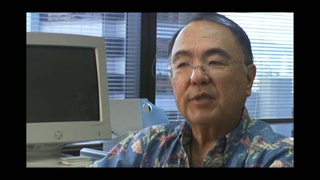Interviews
Treatment of Kibei after return to United States
They were more or less curious because I know... ask me what it say in Japanese, something like that, ask a question, see, so very friendly. But the one not friendly probably stay away from me. But I didn't get any direct insult. I didn't experience, so I never thought of that. But some, well, I think other Kibeis experienced, too. They more or less looked down on it, see. It may have a more education but not in English, in Japanese, so this, as far as knowledge goes, maybe smarter, but then yet, still, Kibei is discriminated, I know.
Date: December 17 & 18, 2003
Location: Washington, US
Interviewer: Alice Ito, Tom Ikeda
Contributed by: Denshō: The Japanese American Legacy Project.
Explore More Videos

Difficulty getting work during World War II
(b. 1921) Nisei businessman. Established "Made in Oregon" retail stores

Discharged from the U.S. Army after Pearl Harbor
(b. 1918) Founder Azumano Travel


Stereotypes about Japanese: past and present (Spanish)
(b. 1937) Professional journalist

World War II hysteria against Japanese in New York City
(1924-2018) Researcher, Activist




Being an American soldier and an "enemy alien"
(1923-2011) Lawyer, MIS veteran, founder of Francis and Sarah Sogi Foundation

Not relating to Japan Americans' experiences on the mainland
(1923-2011) Lawyer, MIS veteran, founder of Francis and Sarah Sogi Foundation


Living conditions in prison while serving time for resisting the draft
(b. 1925) Draft resister

Talking to children about decision to resist the draft during World War II
(b. 1925) Draft resister

Reflecting on Japanese Americans' response to incarceration
(b. 1925) Draft resister

